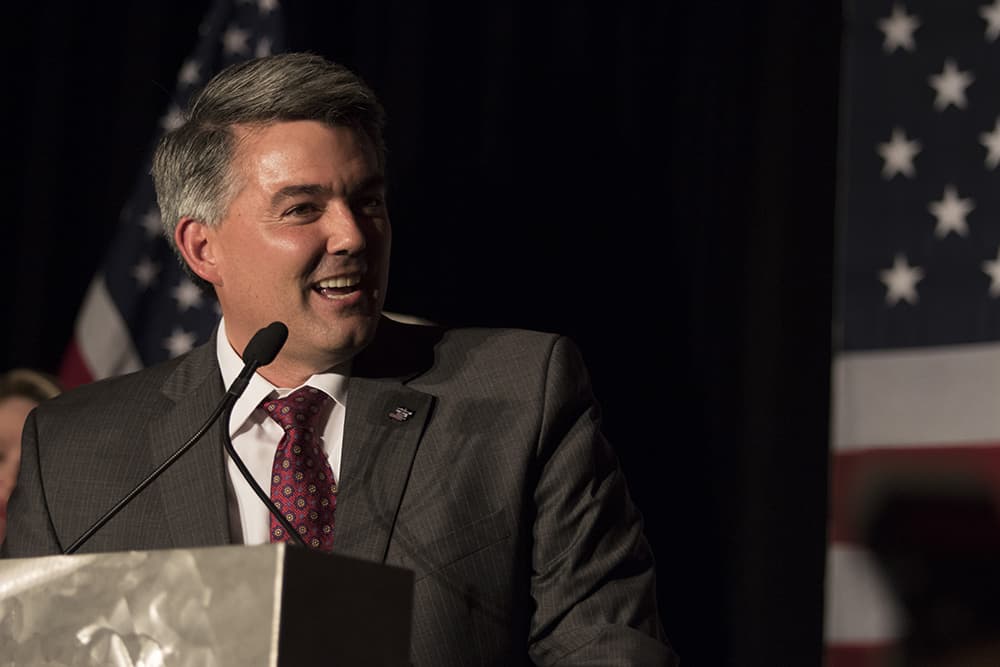
U.S. Sen. Cory Gardner is getting tens of thousands of calls and emails and hundreds of protesters at his field offices. There's even a petition in circulation calling on him to resign over his vote for Secretary of Education Betsy DeVos.
Should Gardner be worried? At this point, not any more than the normal baseline amount for a statewide Republican elected official in Colorado.
"Gardner is pretty much always going to be in a vulnerable position because it is a swing state that leans Democratic," said Seth Masket, a professor of political science at the University of Denver. "He got elected pretty narrowly in a pretty Republican year. He needs to always be on his guard and try to not look too extreme. Everything he does is going to be a combination of doing things for the Republicans who nominated him and doing things that are more centrist."
Right now, Gardner has more to gain from being mostly loyal to his party than by bucking them to appease Democrats who will almost certainly vote for his opponent anyway.
"Gardner will have to get the Republican nomination before he can run in the general election," said Robert Loevy, a professor emeritus of political science at Colorado College. "To not support the new president's nominees, it's questionable that will help him with Democrats, but it will absolutely hurt him with Republicans."
What has Gardner done wrong in the eyes of Democrats?
Well, he's a Republican in a state that voted for Clinton and where opponents of the new president are very energized and very active. Democrats have just 48 votes in the Senate, so they need to peel off Republicans to block the president's agenda, which makes Gardner the target of lobbying.
When he talked to CBS4's Shaun Boyd about the calls and emails that have inundated his office, he suggested many of the calls came from "paid protesters," a comment that was met with its own #notapaidprotestor hashtag from Coloradans who oppose Trump and his policies. Gardner supports repealing Obamacare, and he has voted for all of Trump's nominees so far, including Secretary of Education Betsy DeVos, where just one more Republican defection could have sunk her chances. People protested at his offices over health care, they protested before the DeVos vote, and they protested after the vote.
The change.org petition that's going around initially sought to recall Gardner over the DeVos vote and the "paid protesters" comment. It was changed to a petition calling on Gardner to resign because you can't recall federal elected officials. (Colorado law appears to have a provision that would allow it -- if proponents could get roughly 500,000 signatures in 60 days -- but it's never been tested. And it's likely that it's unconstitutional because states can't put additional requirements on people who hold federal office.) The petition has a goal of 15,000 signatures. Almost 1 million people voted for Gardner in 2014.
Centrist is in the eye of the beholder.
Gardner withdrew his support for Trump during the election and has said he didn't vote for him, instead writing in Vice President Mike Pence's name. Unlike the administration, he maintains his distrust of Russia and has called for investigations into Russian interference in the election, a select committee on cybersecurity and continued sanctions on Russia. He criticized the executive order barring all refugees and immigrants from seven Muslim nations.
So far, Gardner has voted with Trump 100 percent of the time. On the other hand, there haven't been that many votes -- and Gardner is a Republican.
"In the present atmosphere with the line between the parties drawn so sharply, there is a high premium based on party loyalty," Loevy said. "He really has to demonstrate his party loyalty by supporting the Trump nominees unless there is something really appalling."
Loevy pauses here. Democrats did think DeVos was appalling, of course.
"There are things for Democrats to complain about, but by appalling I mean of questionable legality," he said. "Because of the sharp partisan lines, he's doing exactly what he ought to be doing."
It makes sense for Democrats to be protesting right now, Loevy said. It's all they can do.
"At the national level, Democrats are in very bad shape," he said. "They don't control the House. They don't control the Senate. They don't control the White House. About all they have left right now is to lodge political complaint through protest and writing letters."
Masket said he expects Gardner to work on appearing more responsive to constituents, but that's not the same as changing how he votes. And something like a cabinet appointment in 2017 is unlikely to be a major campaign issue in 2020.
"The people raising concerns are a bunch of Democrats who would be unlikely to support him anyway," he said.
Democrats can channel their protest energy into electoral politics, and many are working on doing so. Gardner will run for re-election in a presidential year, when Democratic turnout has traditionally been higher. A lot will depend on how the economy is doing and the general mood of the electorate after four years of Trump.
"If Democrats are energized and have a lot of turnout in four years, he could be vulnerable. On the other hand, not many incumbent senators lose," Masket said.











